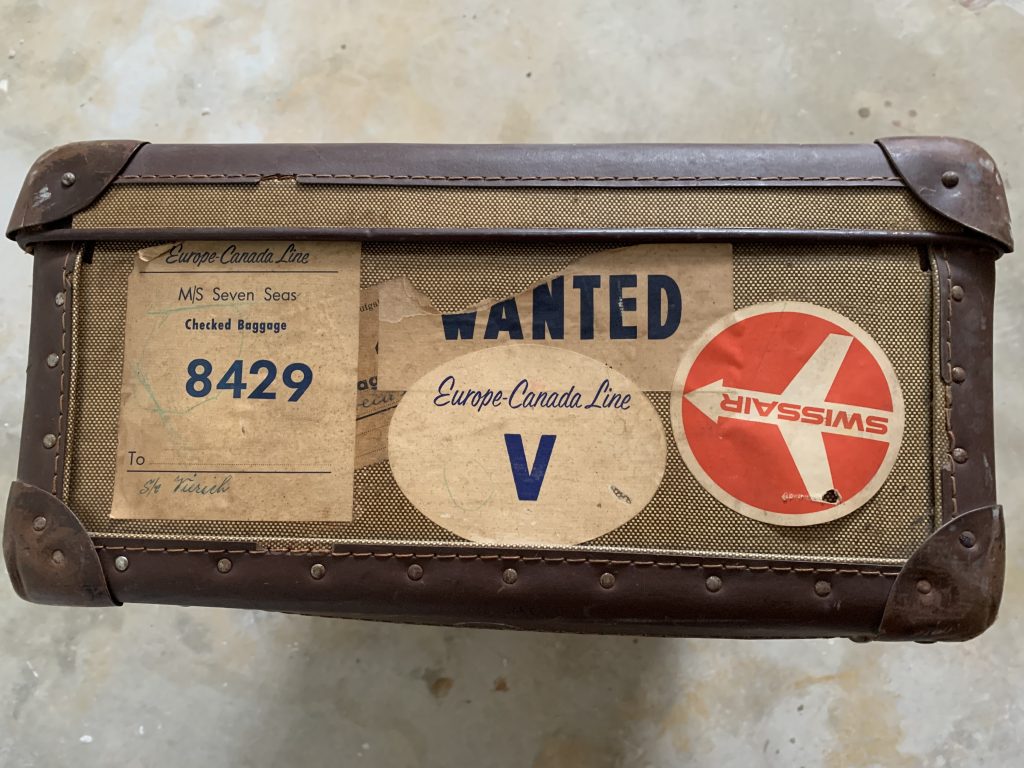
When Gunter Vierich escaped East Germany in 1949 or 1950 – he can’t quite remember which – he carried a small sack with very few possessions. He left his village near Leipzig and met a smuggler at the edge of a forest. In the night he and a few other East Germans threaded their way through the woods to the West. Gunter tells me this story while seated on his tractor seat, outside his home in Madoc Township, Ont., having paused in the job of cleaning snow around his house.
Eight years later, in 1957, Gunter left on a much longer voyage: to Canada. And he carried more substantial luggage: a suitcase, which he hauled aboard the Seven Seas for the trip from Bremenhaven to Halifax. It was a respectable suitcase of the era, made of stiff laminate covered in cloth, with leather reinforcements riveted and stitched at the edges and the corners, leather straps, and metal clasps, to lock it. In Halifax, Gunter collected the suitcase from the sea terminal and carried it to the train station, for the trip west. His destination was Hamilton, given his apprenticeship in Leipzig as a blacksmith and metal worker. But on the train he learned that Toronto was a bigger city, and also had lots of work, so he disembarked at Toronto’s Union Station.

In the station a man spoke in German to Gunter and other young men. He told them he could take them to a boarding house where they could live cheap while they looked for work. Gunter threw the suitcase into the man’s station wagon, which drove north to somewhere near Honest Ed’s discount emporium, around Bathurst and Bloor streets. Gunter carried the suitcase up the stairs to the room he shared with three other men, and set the suitcase beside a cot: his first home in the New World.
Before he sailed to Canada Gunter had already met his future wife, Elsa, in West Germany. A few years later he went back to get her.
The pair succeeded in the New World. After years in Toronto, they brought their two sons to Madoc, where they bought a farm and built a stately brick house. They also built a workshop and a barn, and acquired all the trappings of success, or at least the necessities of this place: sewing machines, a lawn tractor, a tractor, a workshop full of tools to work with steel and with wood, beehives, cattle and pigs for a time, a house full of art and wood furniture, much of which Gunter made himself; comfortable chairs, television, books and plants and dishes and music.
And now, it is time for Gunter to move again. He is 90; Elsa is younger. They don’t want to work so hard anymore to care for their farm, and so this spring they will uproot to a retirement residence in Belleville, about 40 kilometres away.
“You know, I still have that suitcase,” Gunter said to me the other day. “What I really want is to take what that suitcase will hold, and leave everything else.”

It probably won’t work out that way. But it doesn’t really matter what furniture or trinkets he takes, or how many boxes he ends up moving, or what stuff he leaves behind. I believe Gunter, who is more than an amateur philosopher, has figured out by now that none of the possessions you take with you or leave behind really matter. Twelve years ago, Gunter and Elsa sold us the land next to them, and they have been the best of neighbours, and entertained us and taught us lawn mower repair, and explained countless things as we bumbled through the job of looking after a piece of land. When he goes, Gunter will take with him his passion, his dedication, his self-deprecating gentle humour, his smile, and his warmth. Those are the things he brought from Europe, and that he spread, and that he leaves behind for us, too.
Gunter says hello to our puppy, Rook, in Madoc, Ont., February, 2022.

